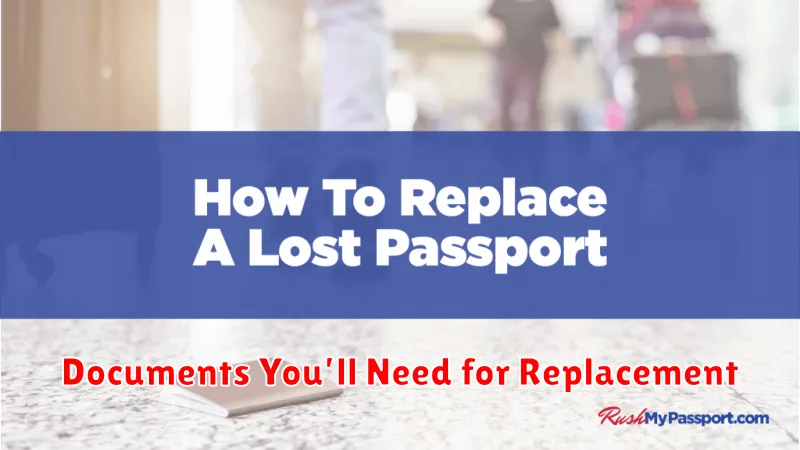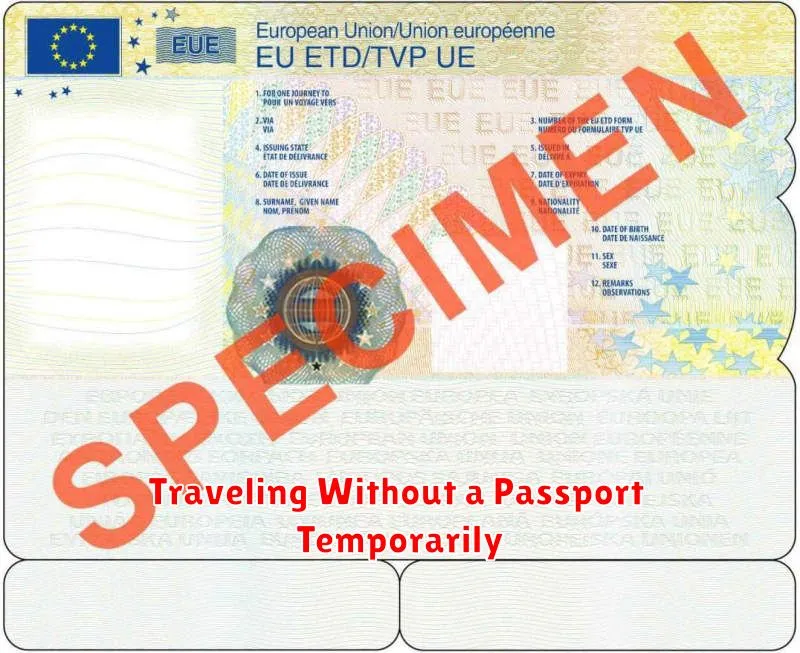Losing your passport abroad can be a stressful and disorienting experience. It’s a crucial document that proves your identity and citizenship, allowing you to travel internationally and access essential services. If you find yourself in this unfortunate situation, knowing what steps to take immediately can significantly minimize disruption to your travels and help you obtain a replacement passport as quickly as possible. This article provides a comprehensive guide outlining the crucial steps you should follow if you lose your passport abroad, covering everything from initial reporting to applying for an emergency travel document. Understanding these procedures will empower you to navigate this challenging situation efficiently and confidently.
Whether you are a seasoned traveler or embarking on your first international trip, being prepared for the possibility of a lost or stolen passport is paramount. The information provided here will equip you with the knowledge necessary to handle this scenario effectively, including contacting your embassy or consulate, obtaining necessary documentation, and understanding the replacement passport application process. Don’t let a lost passport derail your travel plans. Learn what you need to do if you lose your passport abroad and take the stress out of this potentially daunting situation.
Don’t Panic: First Steps to Take
When faced with a sudden crisis, it’s natural to feel overwhelmed. The key is to avoid impulsive reactions. Stop, take a deep breath, and assess the situation. Identify the immediate dangers and address them first. This might involve ensuring your safety, contacting emergency services if necessary, or providing basic first aid. Focusing on immediate needs helps establish a sense of control and clarity.
Once immediate dangers are addressed, gather information. Understanding the nature and scope of the situation is crucial for making informed decisions. Reliable sources, such as official statements or established news outlets, can provide accurate updates. Avoid spreading unverified information or rumors, as this can exacerbate anxiety and hinder effective response efforts. Focus on facts and verifiable details to gain a clear picture of the situation.
Finally, develop a plan. Based on the information gathered, determine the next steps. This may involve creating a communication strategy, securing essential resources, or seeking support from family, friends, or community organizations. Even a basic plan provides a sense of direction and can empower you to take effective action. Remember to remain adaptable and adjust your plan as the situation evolves.
Locate the Nearest Embassy or Consulate
Locating the nearest embassy or consulate is crucial for citizens traveling or residing abroad. These diplomatic missions serve as vital resources for citizens in need of assistance, offering support in situations ranging from lost passports to legal emergencies. They can also provide information on local laws and customs, and facilitate communication with local authorities. Before traveling internationally, it’s highly recommended to identify and make note of the contact information for your country’s nearest embassy or consulate at your destination.
To find the nearest embassy or consulate, you can typically utilize your government’s official foreign affairs website. Most foreign affairs ministries maintain online directories of their diplomatic missions worldwide. These directories typically allow you to search by country or city, providing contact details, including addresses, phone numbers, and email addresses. Additionally, many governments offer mobile applications that can quickly locate nearby embassies or consulates based on your current location.
Remember that in emergency situations, you can usually contact your embassy or consulate 24/7 through an emergency hotline. This number is often prominently displayed on the embassy or consulate’s website. Be sure to have this information readily accessible during your travels.
Documents You’ll Need for Replacement

Replacing a lost, stolen, or damaged item often requires specific documentation. You’ll generally need to provide proof of ownership, such as an original receipt, warranty information, or photographs of the item. Additionally, identification will be necessary. This could include a driver’s license, passport, or other government-issued ID. Depending on the item and the circumstances of its replacement, further documentation might be required.
If the item is insured, contacting your insurance company is crucial. You’ll likely need to file a claim and provide them with any relevant information, including police reports (if applicable) and documentation of the item’s value. This may include appraisals or purchase receipts. Your insurer will then guide you through their specific claim process.
For certain replacements, like vital records (birth certificates, passports, etc.), specific procedures and documents are mandated by the issuing agency. Check their website or contact them directly for detailed instructions and a list of required documents. These may include application forms, supporting documentation, and applicable fees.
Filing a Police Report
Filing a police report is a crucial step in documenting a crime or incident. It creates an official record of the event, which can be vital for insurance claims, investigations, and legal proceedings. When filing a report, be prepared to provide accurate and detailed information, including the date, time, and location of the incident, as well as a thorough description of what occurred. Remember to include information about any individuals involved, witnesses, and any property damage or losses.
You can typically file a police report in person at your local police station, online through their website, or by phone. However, for serious crimes or emergencies, it is always recommended to contact 911 immediately. When speaking with an officer, remain calm and provide clear and concise answers to their questions. Obtain a copy of the police report for your records, noting the report number for future reference. This number will be essential for following up on the case and providing information to other relevant parties.
While the process may vary slightly depending on your location and the nature of the incident, the importance of accurate and timely reporting remains consistent. A well-documented police report can significantly aid in the resolution of the issue and protect your rights.
Traveling Without a Passport Temporarily

While a passport is typically required for international travel, there are limited circumstances where you might travel without one, at least temporarily. These situations usually involve closed-loop cruises, participating in a Western Hemisphere Travel Initiative (WHTI) compliant program, or travel to US territories. WHTI allows US citizens to use specific documents like Enhanced Driver’s Licenses or Trusted Traveler Cards (NEXUS, SENTRI, FAST) for land and sea travel within North America. US territories, such as Puerto Rico or the US Virgin Islands, generally do not require a passport for US citizens traveling directly from the US mainland.
It’s crucial to understand that even in these limited cases, carrying alternative identification like a driver’s license and birth certificate is highly recommended. Situations can arise where additional documentation is necessary, such as unexpected medical emergencies requiring air evacuation back to the mainland US. Always verify the specific entry and exit requirements of your destination and mode of transportation with the relevant authorities or your travel provider well in advance of your trip.
Remember, while temporary travel without a traditional passport is possible in certain narrow circumstances, it’s always best to hold a valid passport for any international or even domestic travel. This provides the greatest flexibility and ensures smoother travels should unexpected situations arise.
Using Insurance for Assistance
Insurance serves as a critical safety net, providing financial protection against unforeseen events. It functions by pooling resources from many individuals to cover the costs of those who experience a covered loss. This can range from healthcare expenses and property damage to liability claims and even loss of income. By paying regular premiums, policyholders transfer the risk of potentially devastating financial burdens to the insurance company.
Understanding your insurance policy is essential for maximizing its benefits. Key aspects include the coverage limits, which specify the maximum amount the insurer will pay for a claim, and the deductible, the amount the policyholder must pay out-of-pocket before coverage kicks in. Policies also outline specific exclusions, situations or events that are not covered. Carefully reviewing these details will help ensure you have adequate coverage and understand your responsibilities in the event of a claim.
When filing an insurance claim, it’s important to be prompt and thorough. Gather all necessary documentation, including photos, police reports, and medical records, to support your claim. Maintain open communication with the insurance adjuster and provide any requested information promptly. This will help expedite the claims process and ensure a fair and timely settlement.
Preventing Passport Loss in the Future
Losing a passport can be a stressful and expensive ordeal. To prevent future loss, consider several preventative measures. Secure your passport in a safe place when not in use, such as a fireproof safe or a locked drawer. When traveling, use a dedicated passport holder or pouch worn close to your body, preferably under your clothing. Avoid leaving your passport in easily accessible bags or pockets, and be particularly vigilant in crowded areas known for pickpocketing.
Photocopy your passport’s information page and keep it separate from your actual passport. This copy can expedite the replacement process if your passport is lost or stolen. Additionally, consider registering your passport with the relevant government authorities. This registration can assist in its recovery and provide you with necessary support in case of loss.
Finally, practice situational awareness at all times. Be mindful of your surroundings and keep your belongings secure. Avoid displaying your passport unnecessarily in public places. By taking these simple precautions, you can significantly reduce the risk of losing your passport and avoid the associated hassles.

